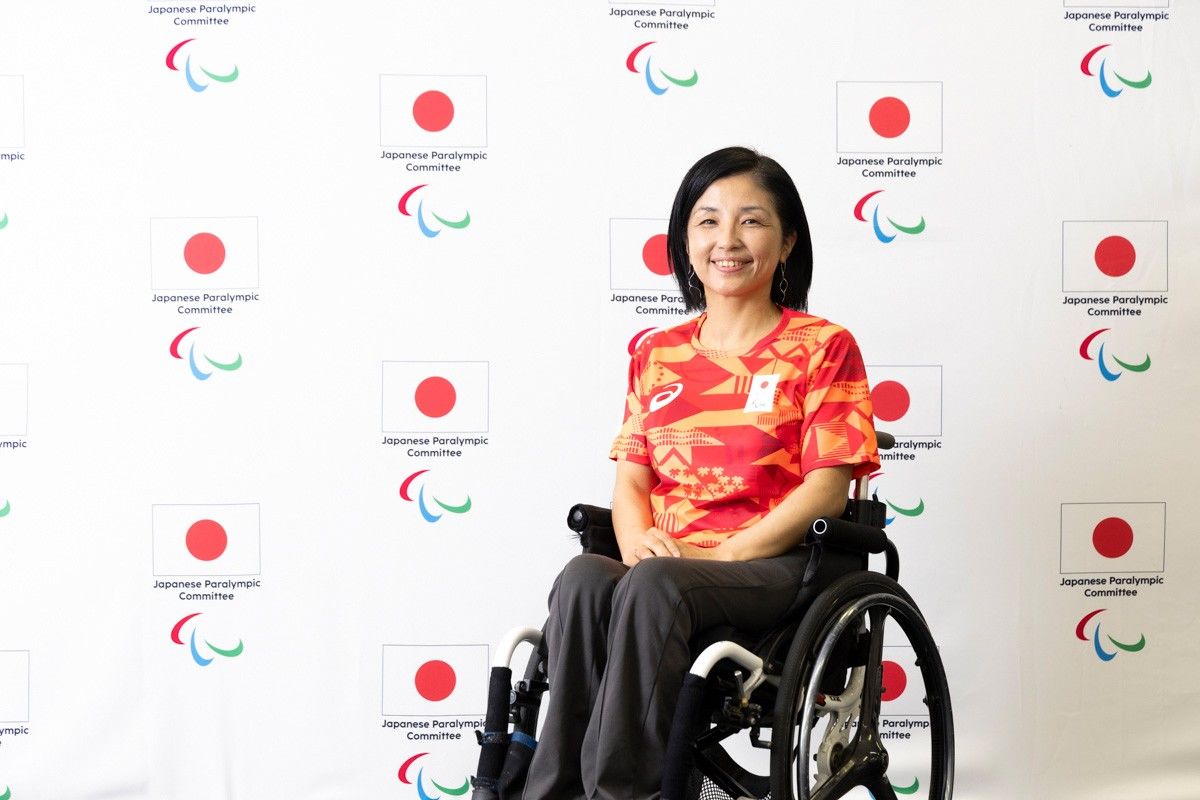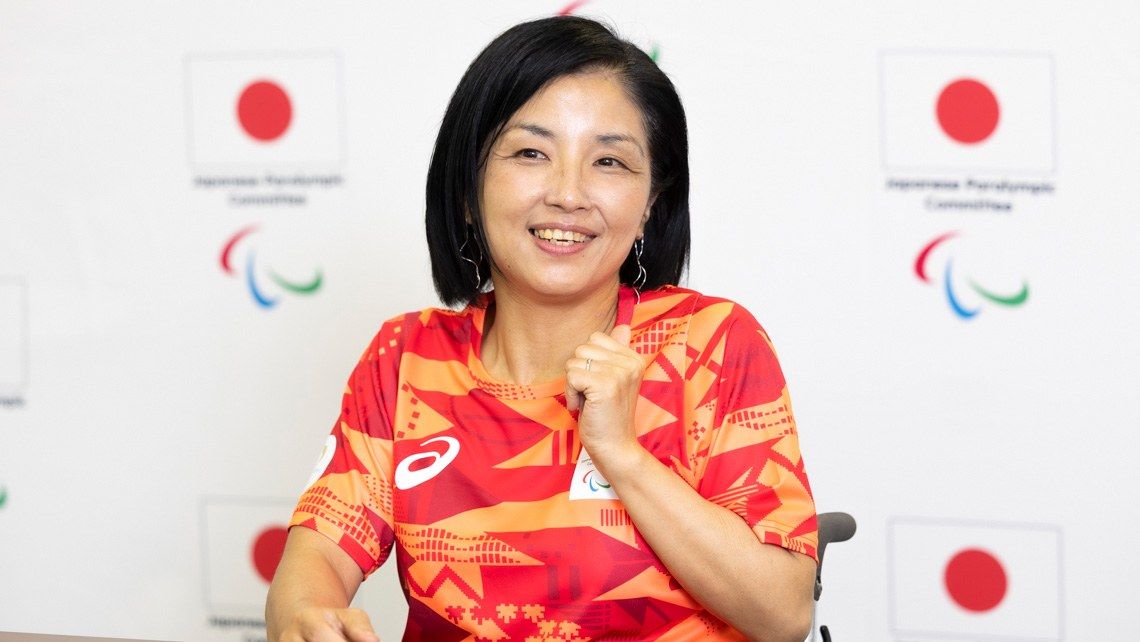
Taguchi Aki: Japanese Paralympic Delegation Head Shares Outlook for Paris and Hopes of Games Spurring Social Change
Sports- English
- 日本語
- 简体字
- 繁體字
- Français
- Español
- العربية
- Русский
Great Expectations
INTERVIEWER Japan is sending its largest delegation of Para-athletes yet to compete at the 2024 Paralympics in Paris. What are your expectations for the games?
TAGUCHI AKI Our aim is to bring home more medals than the record 52 that we won in Athens. The Japanese team’s motto “Strive to be your best” encapsulates the hopes for each individual athlete to give their all. The words are meant to inspire competitors not only to strive to win, but to put their best selves forward on and off the field of play.
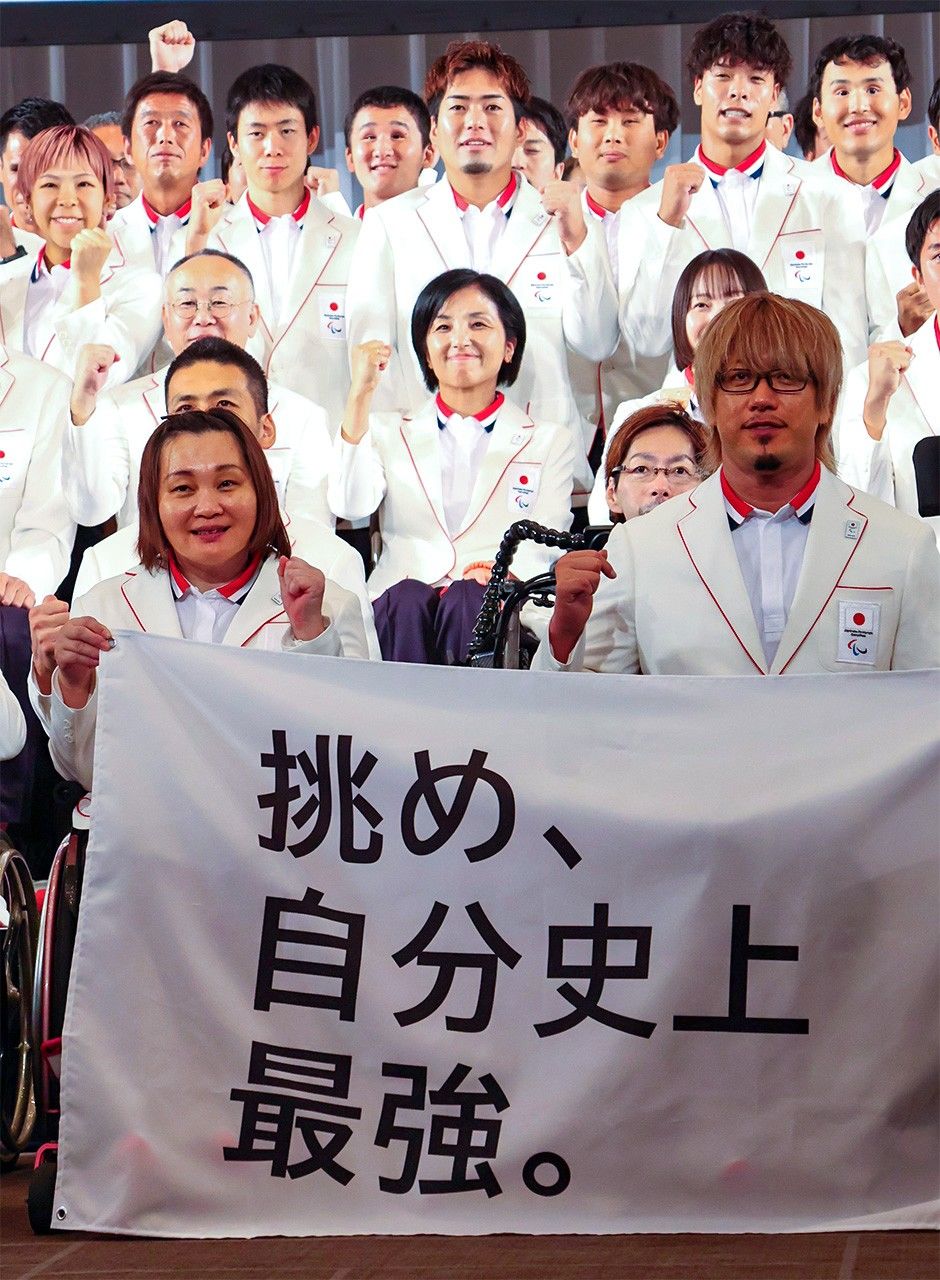
Taguchi Aki (center) and other Japanese Paralympic team members unveil the team’s motto at the official launch ceremony in Chiyoda, Tokyo, on July 16, 2024.(© Matsumoto Sōichi)
INTERVIEWER You have closely followed the progress of Japanese athletes as they prepare for the games. What efforts have you made to bolster the overall level of the team?
TAGUCHI We have of course benefitted from having more and more experienced athletes participate in the Paralympics. But the burgeoning number of newcomers and women has also helped to boost our competitiveness. Even prior to the 2020 Tokyo Paralympics, the Japan Rising Star Project was helping discover and develop promising talent through time trials and training. The program uncovered eight athletes who are now part of the national team, including swimmer Kinoshita Aira and boccia player Ichinoe Ayane.
Programs for unearthing new talent are effective as they make it easier to judge whether athletes with disabilities have the traits to match the characteristics of a certain sport. I myself had no sporting experience before becoming a wheelchair user at the age of 25. It just happened that I proved suited to shooting. Matching is crucial, because an athlete’s physical abilities may not suit certain events.
Through J-STAR, we are also implementing cross-training, incorporating other events, and trying to devise effective training techniques.
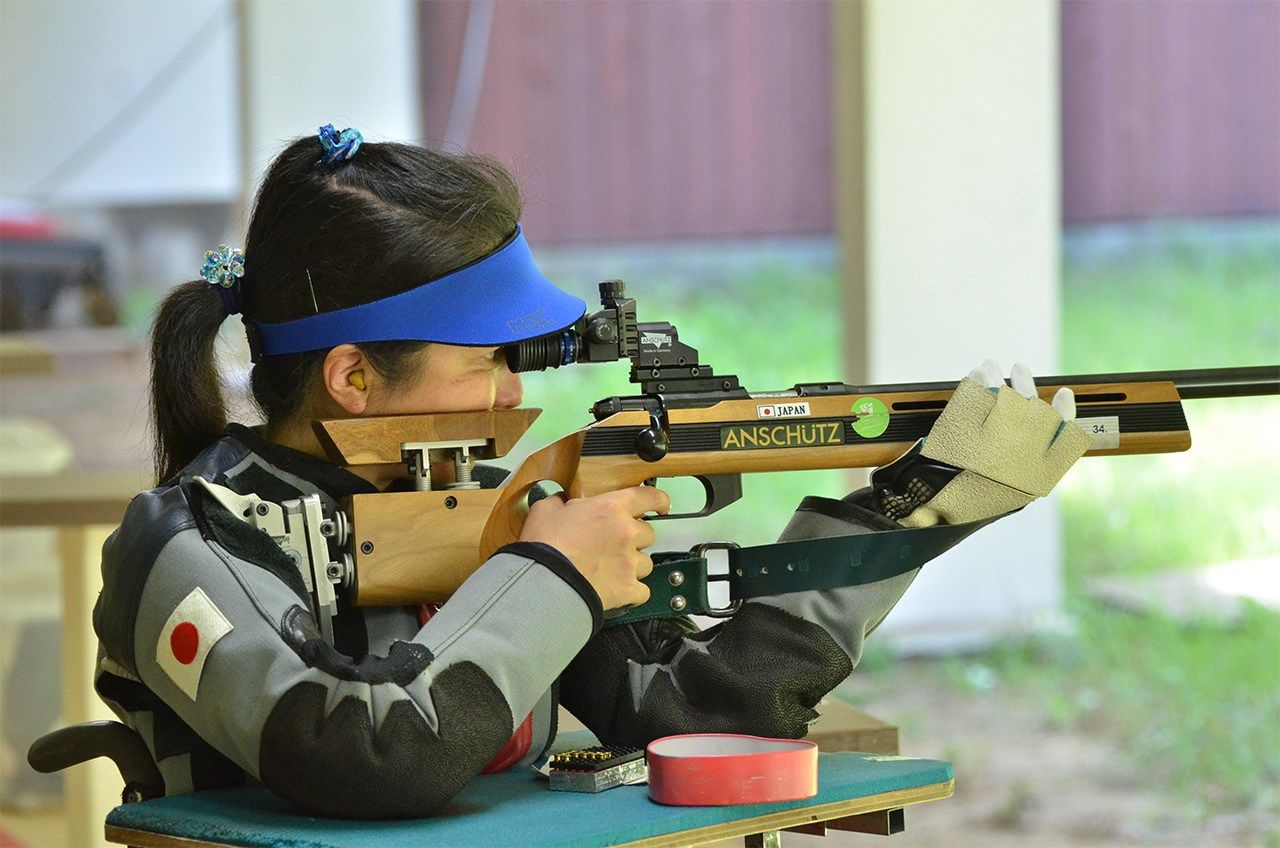
Taguchi warms up before the shooting competition at the London Paralympics in July 2012. (© Taguchi Aki)
A Combined Effort
INTERVIEWER How has the parasports environment in Japan changed since the Tokyo Games?
TAGUCHI After Tokyo was awarded the games in 2013, responsibility for preparing for the event shifted from the Ministry of Health, Labor, and Welfare to the Japan Sports Agency, under the Ministry of Education, Culture, Sports, Science, and Technology. In 2019, the Indoor Training Center East was established to complement the National Training Center in Kita, Tokyo. The facilities were designed for accessibility, with court areas built specifically for parasports, including wheelchair rugby and boccia.
Now, there are more companies that employ Paralympians and parasports athletes, enabling athletes with disabilities greater opportunities to compete. These changes have come about because of the Tokyo Games.
In the preparatory stage of the Tokyo Olympics and Paralympics, the Athlete Committee, which was part of the organizing committee, included both Olympians and Paralympians. From the outset, there was strong support among all committee members of calls from Paralympians to construct universally accessible facilities rather than adding accessibility features specifically for the Paralympic Games, a suggestion that was adopted.
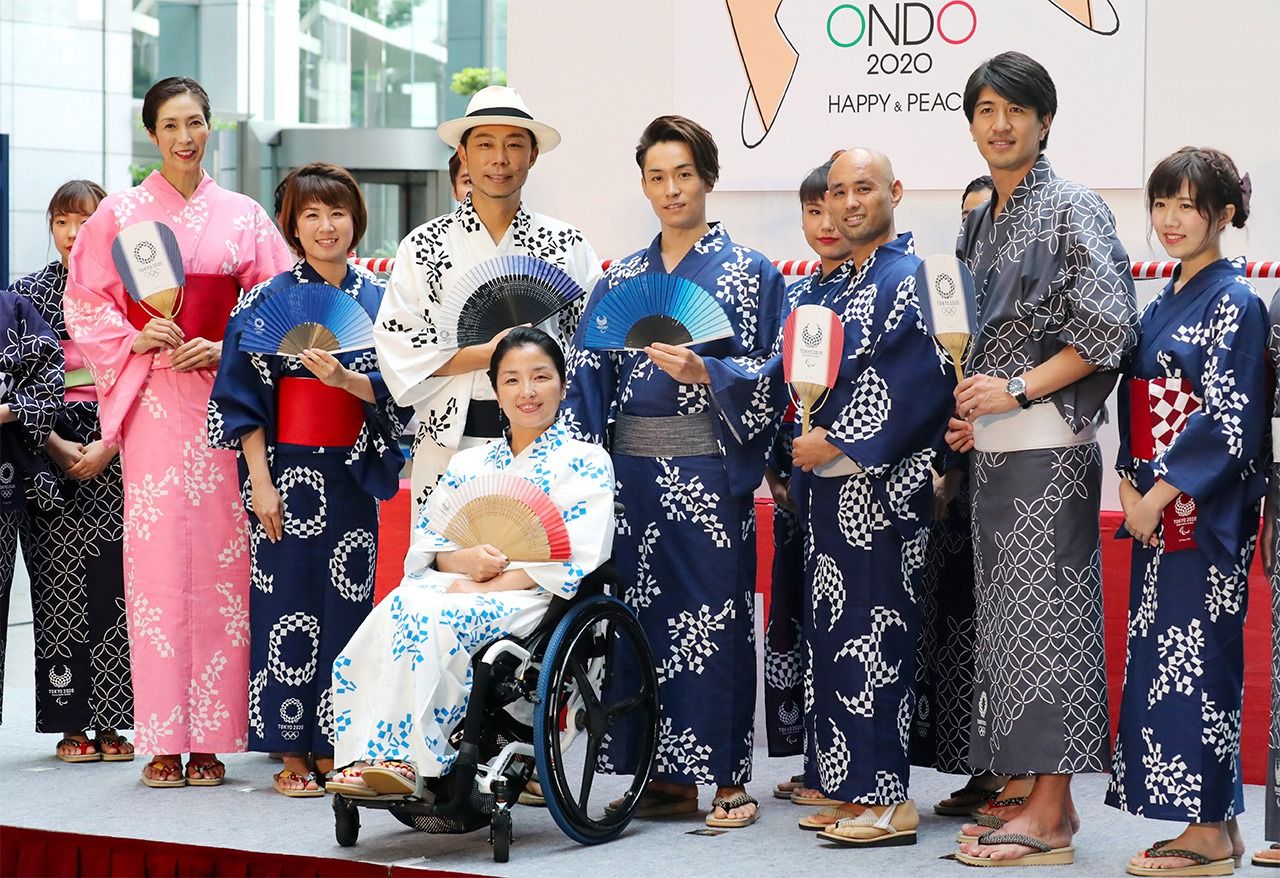
Taguchi joins athletes and entertainers at a Tokyo 2020 promotional event in Tokyo in 2018. (© Jiji)
Previously, members of various Olympic and Paralympic committees and others have cooperated in the bidding process. Around 2009, during the bidding process for the 2016 Games, there was a good deal of sharing of ideas among the Olympic and Paralympic sides, even as each were under the jurisdiction of different ministries. The Olympics were awarded to Rio de Janeiro, but Olympians like Murofushi Kōji, the current JSA commissioner, reached out to us saying that although it was not yet possible to operate as one organization, there were many joint initiatives that were still possible.
Later, Paralympians participated in the JOC’s Athletes’ Committee and other bodies, creating a sense of unity, which I believe led to our success in being awarded the Tokyo Games. In just four years, our bidding efforts changed significantly.
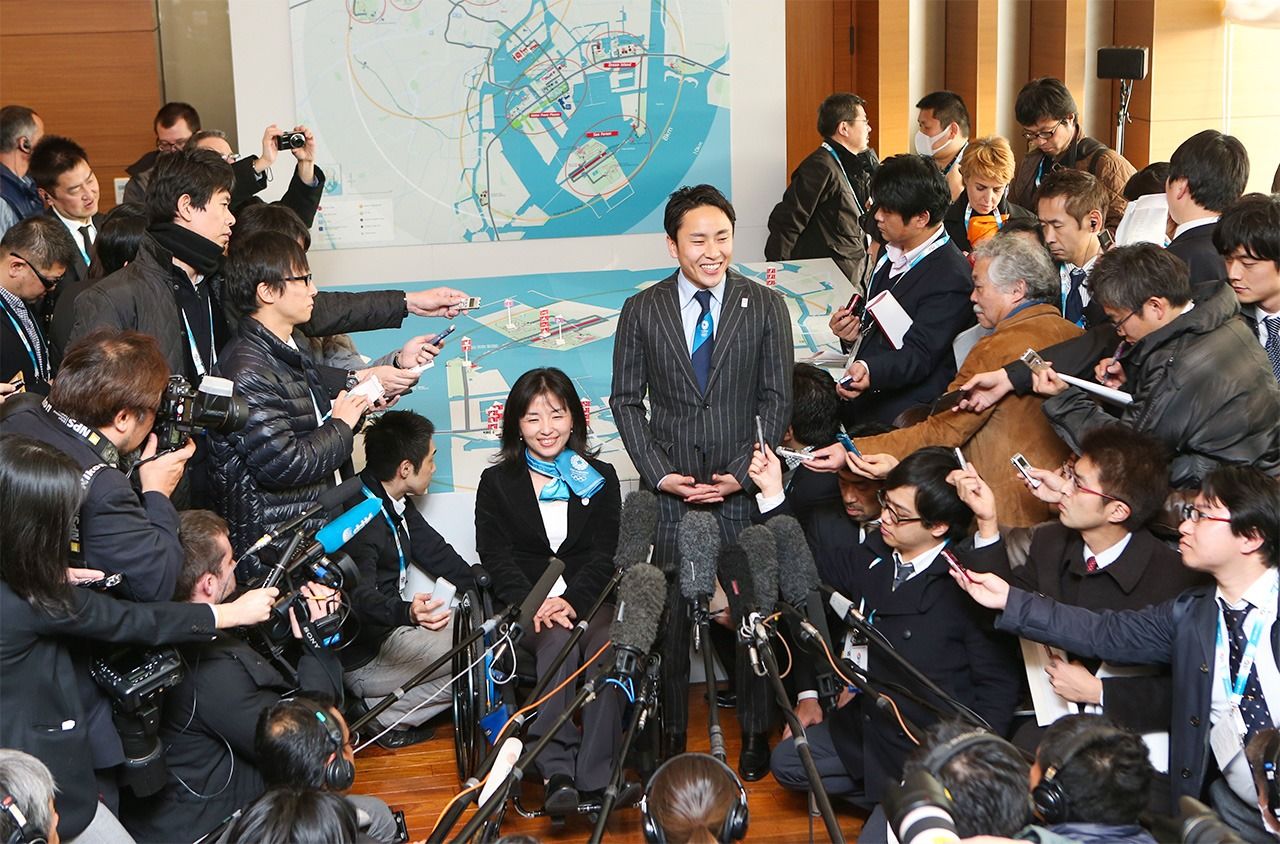
Taguchi and Olympic fencer Ōta Yūki speak to the press in Tokyo following a presentation to the International Olympic Committee in 2013. (© Jiji)
INTERVIEWER To what degree have the barriers between the Paralympic and Olympic Games been removed?
TAGUCHI I feel that we created a more inclusive environment in the sporting world in each step of our preparations for the Tokyo Games.
Now it’s become the norm for representatives of organizations for people with disabilities to be part of discussions to resolve issues. We appreciate when able-bodied individuals take our issues into consideration, but the outcomes can fall short unless the opinions of all the concerned parties are included. It is more meaningful when people with disabilities and those without plan together.
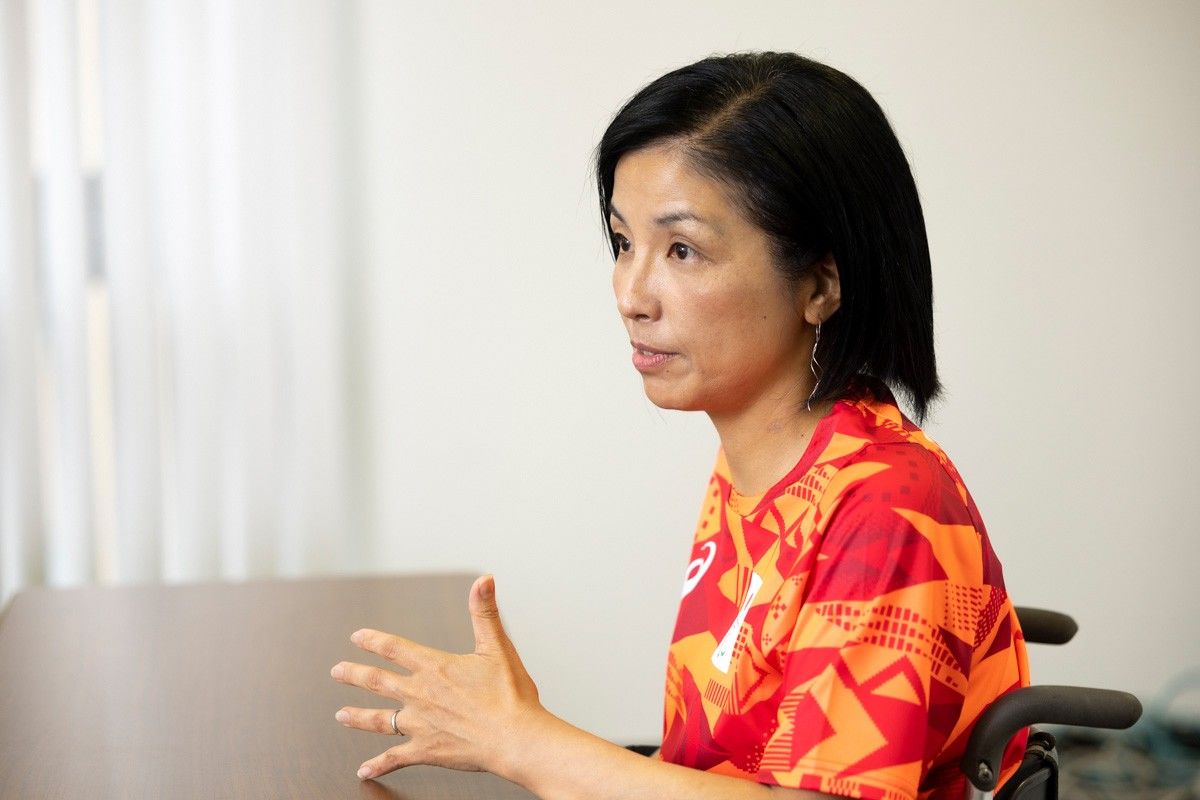
Taguchi says the Tokyo Games helped reduce the barriers between Olympians and Paralympians. (© Kawamoto Seiya)
Paralympics and Social Change
INTERVIEWER What do you feel is the legacy of the Tokyo Paralympics?
TAGUCHI The fact that we were able to stage the Tokyo Games during the COVID-19 pandemic was an achievement in itself. I was involved in the bid, as a torch relay ambassador, and as deputy head of the athletes’ village. Athletes and officials from every country expressed their gratitude for Japan’s efforts.
I feel that the games also helped to change attitudes in Japanese society toward people with disabilities. In the past, when people saw a disabled person in public, they tended to stare from a distance. Now, for a wheelchair user such as myself, I don’t feel that sense of unease, and people are more likely to come up and speak to me. Accessible toilets and slopes have become more common, and people with disabilities are getting out more. Consequently, able-bodied people are more accustomed to seeing us. Use of the term “inclusive society” has also become widespread.
When I first became a wheelchair user, over 25 years ago, you rarely saw people with disabilities, and it wasn’t easy for us to get about. When I went out with my able-bodied friends, I’m sure I caused trouble in terms of finding toilets and so on. But now there is a greater range of options, which makes it easier to go out together.
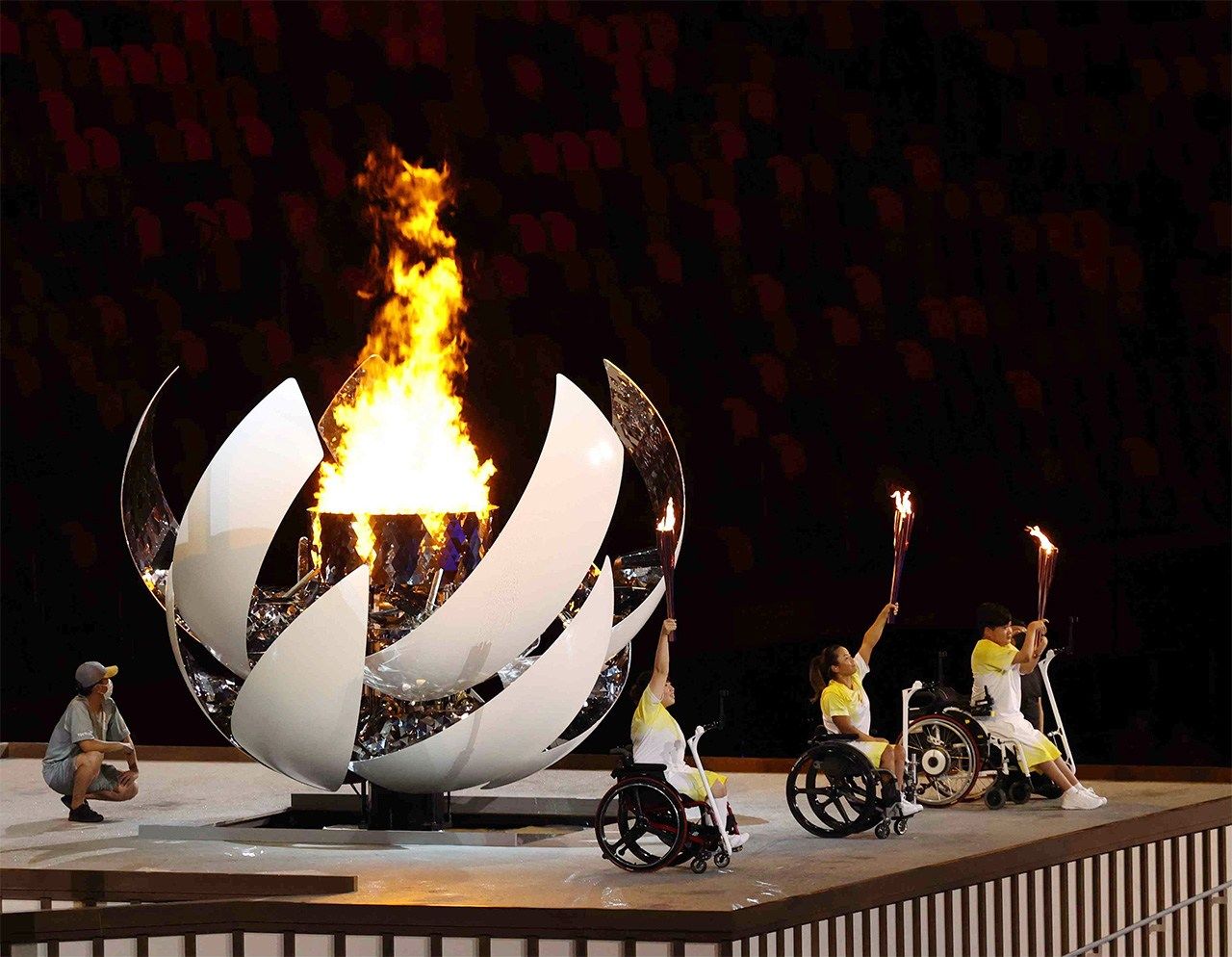
The lighting of the flame during the opening ceremony of the Paralympics at the National Stadium in Tokyo on August 24, 2021. (© Jiji)
Building a Groundswell of Change
INTERVIEWER Looking through the lens of your experience, how do you think the view of parasports will change in the medium-to-long term? Also, are there any lessons from the Tokyo Games that you wish to share with Paris?
TAGUCHI Transformation is gradually taking place. At my first Paralympics in Athens, the newspapers presented the games as a social story, with a strong welfare slant. Nowadays, a lot of Paralympic results make it to the sports pages, with focus on the competitive aspect.
Another example is the medals. At the Rio de Janeiro Paralympics, medals contained tiny steel balls designed to produce a different sound for each color, making them recognizable to blind athletes. In Tokyo, the medals were designed with a differing number of indentations on the edges. The Paralympics medals for Paris have different numbers of lines engraved on the edge; one for gold, two for silver, and three for bronze.
In Rio, the view from some of the wheelchair seating areas were blocked by fencing. From this experience, we asked the Tokyo Organizing Committee to adjust the height of floors and barriers to better accommodate wheelchair users. Paris officials and para-athletes have no doubt suggested further improvements after seeing the Tokyo Games. I hope that these innovations can be implemented throughout Japan to gradually improve society. This is what I hope Tokyo can share with Paris and I look forward to seeing the results of their efforts.
Supporting Athletes
INTERVIEWER What are your hopes for Paris as head of Japanese delegation?
TAGUCHI At a ceremony held on July 16 to celebrate the launch of the Japanese team, the para-athletes were encouraged to demonstrate the results of their training, their limitless potential, and to embody the values of the Paralympic Games.
The athletes are no doubt nervous and feel a great deal of pressure. When I last competed, in London, I was overly focused on winning a medal, and the pressure was immense. There are people who can turn stress to their advantage and those who can’t. Also, there are people who prefer the company of others when faced with pressure and others who focus better alone. I want to reduce the stress athletes feel even a little, to communicate clearly with all the athletes and staff, and to create an atmosphere where people feel free to approach me.
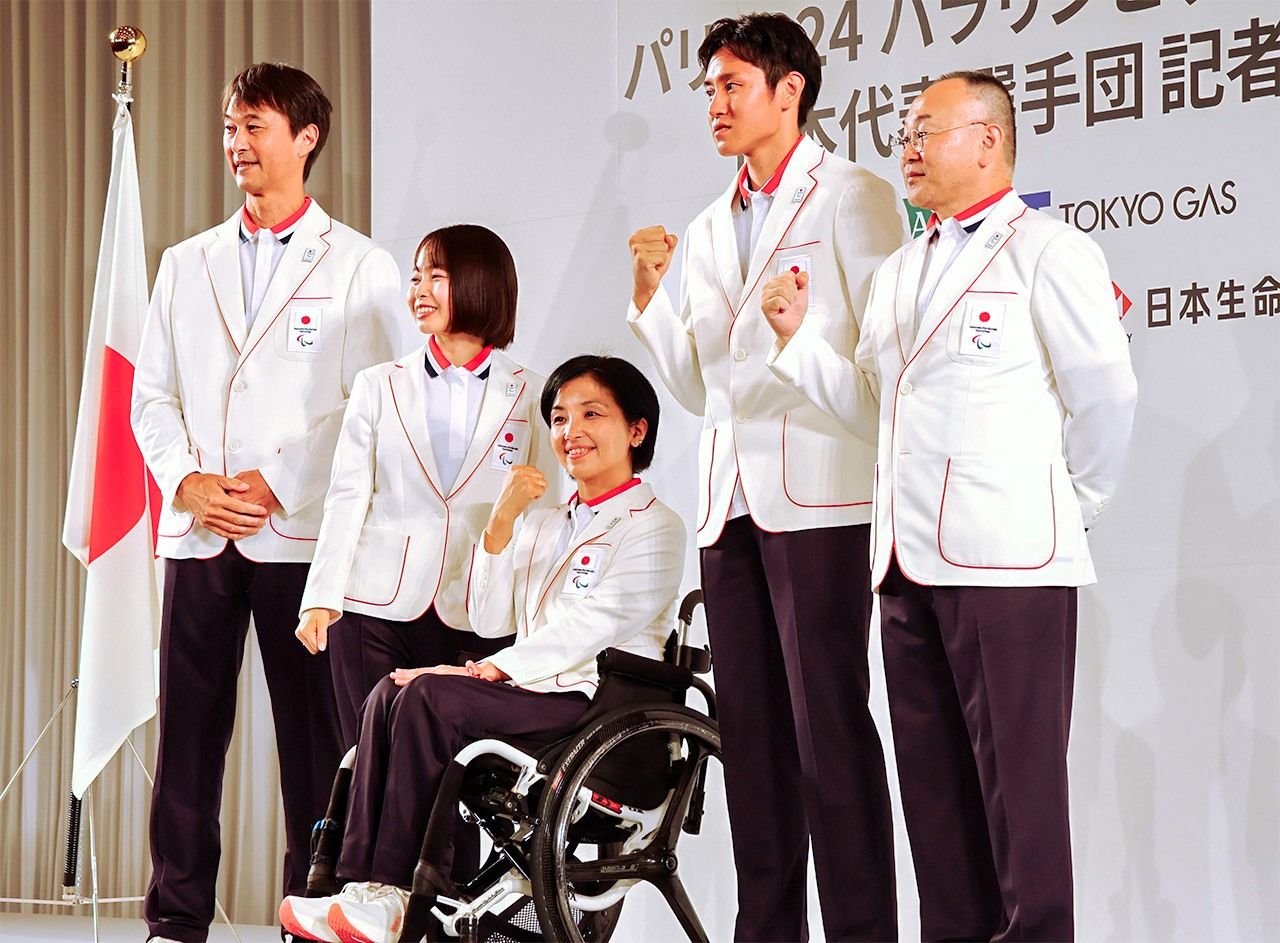
From left: Wheelchair tennis coach Nakazawa Yoshihiro, swimmer Nishida An, Taguchi, long jumper Ishiyama Daiki, and Ida Tomohiro, Secretary General of the Japanese Paralympic Committee, at the official launch ceremony for Japan’s Paralympic team. (© Matsumoto Sōichi)
Sit Back and Enjoy the Games
INTERVIEWER How do you view the increasing interest in the Paralympics among the general public?.
TAGUCHI I can say from experience that the motivation of athletes receive a boost by the support they receive from Japanese fans.
After watching the Rio Games, a friend told me that it opened their eyes to how many people with disabilities there are in the world as well as the range of different disabilities that exist. They were moved at how the games celebrated disability and leveraged it in competition. I hope that more people will watch the Paralympic Games and have their impression similarly changed.
Hopefully we can build a society where people with disabilities can do whatever they want, anywhere they want, and where they can share their ideas and experiences openly with a diversity of people.
(Originally published in Japanese based on an interview by Matsumoto Sōichi. Banner photo © Kawamoto Seiya.)

